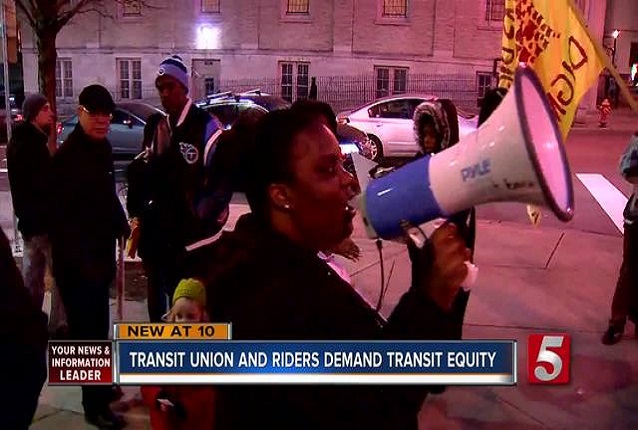This February not only marks Black History month, but also underscores the ongoing fight for racial and economic justice. We are living in a moment where our elected leaders feel comfortable exhibiting white supremacy, refer to African and Caribbean countries as “shitholes,” and proclaim that racism should be the norm. The Trump administration spews rhetoric declaring that immigrants and people of color are undeserving of basic human rights. This requires us to take bold action against racist ideologies and white nationalism.
Although it’s been 63 years since Rosa Parks took a stand that initiated the Montgomery bus boycott, segregation persists within communities’ public transportation systems. In an effort to push back against discrimination, and in honor of Rosa Parks’ birthday, advocates and transit employees launched Transit Equity Day on February 5. Atlanta Jobs With Justice, Central Florida Jobs With Justice, the Coalition for Economic Justice, Colorado Jobs With Justice, Tucson Jobs With Justice, the Labor Network for Sustainability, Amalgamated Transit Union and other partners participated in the day of action. One of the goals was to renew the demand for equitable and accessible public transportation that all communities deserve. Another aim was to provide support to people working in this sector, like those with disabilities, those earning low incomes, and communities of color, as automation may pose a threat to and further disenfranchise them.
Besides disparities in transit, we continue to see the inequality within classrooms across the country. Education is a right all students merit, but privatization, intentional underfunding and cutbacks undermine it. Teacher’s caucuses, including the National Education Association and American Federation of Teachers, along with Colorado Jobs With Justice and Massachusetts Jobs With Justice kicked off Black Lives Matter at School on February 5. The day of action called attention to the struggle for racial equity in the classroom. We can’t celebrate Black History month without also elevating decades of struggling to achieve adequate funding in public schools, culturally-competent curricula, and improved teacher and student retention. This month, educators are projecting a vision of what it would mean if Black Lives indeed mattered in education, and a system that reflects it.
Jobs With Justice and our network of local coalitions know that racial and economic justice intertwine. We can’t achieve either one if we don’t first tackle white supremacy. We must recognize the ways it keeps working people oppressed: both within the public transit systems in their communities, and in having a say in their classrooms.




